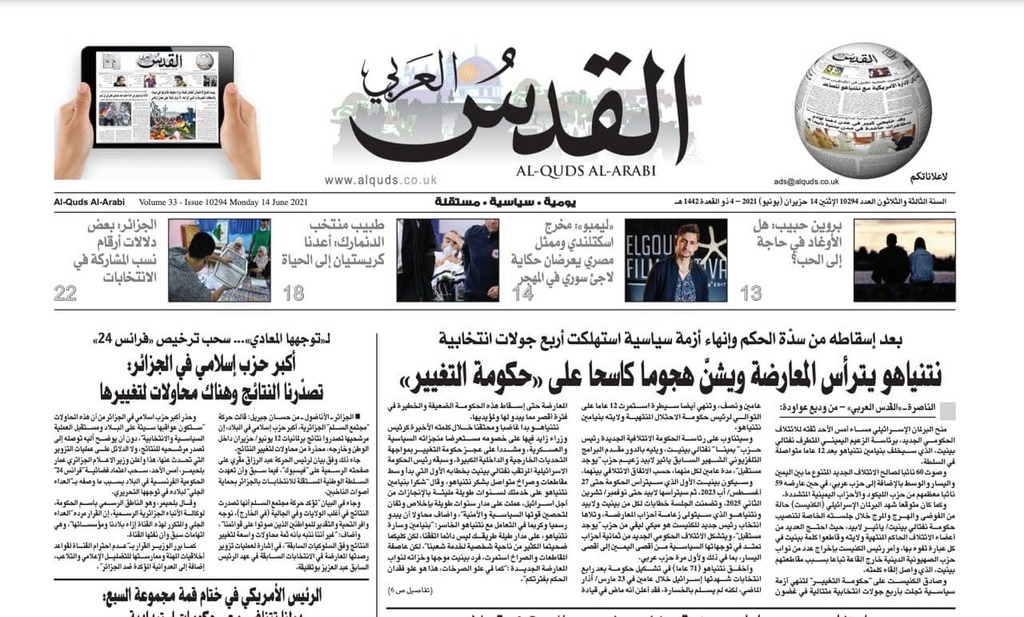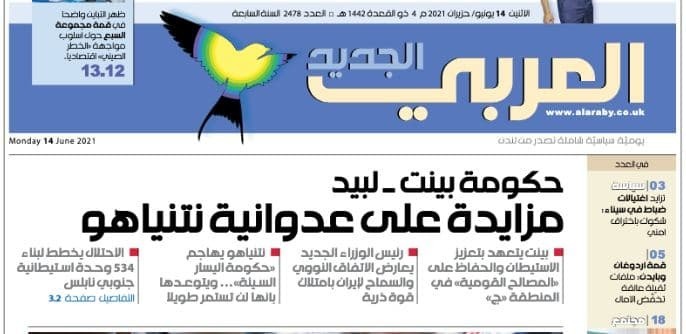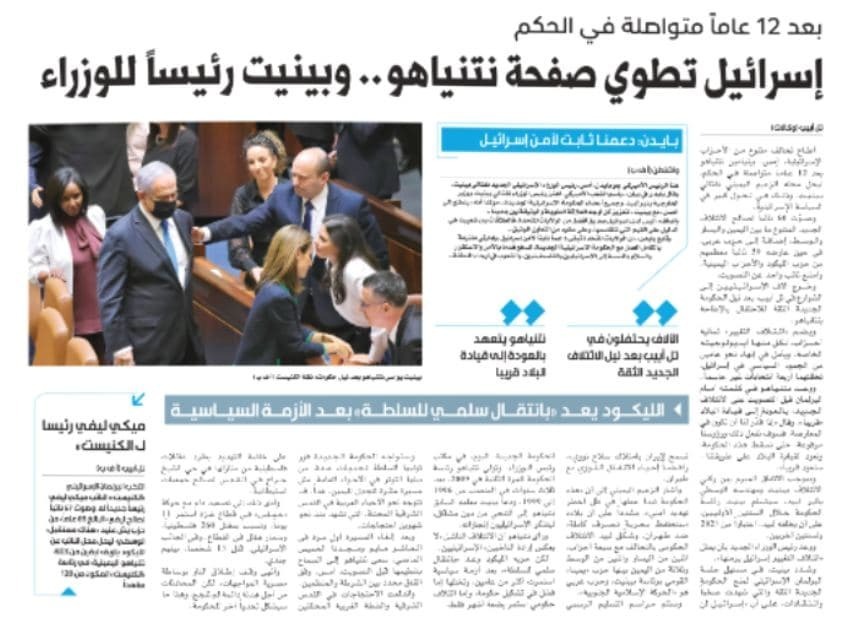Much like the rest of the world, the Middle East followed closely after the change of government in Israel, and Arab media has extensively covered the swearing-in of the Bennett-Lapid administration.
Arab outlets focused heavily on the identity of the incoming premier, Naftali Bennett; on the historic integration of an Arab party in the coalition; and on the windup of Benjamin Netanyahu's 12-year tenure.
Some outlets, such as Qatar's Al-Jazeera, even broadcast large parts of the Knesset session live.
"After yesterday's vote on a new government led by Naftali Bennett, which won the support of 60 members [of Knesset] and whose broad composition includes eight parties from the right and left and even the Islamic Movement faction led by Mansour Abbas, the 12-year tenure of Benjamin Netanyahu has ended," the London-headquartered Arabic international newspaper Asharq Al-Awsat, which airs the line of the Saudi government, reported Monday morning.
The newspaper also noted that the new government will also include an Arab minister — Issawi Frej of Meretz, who serves as regional cooperation minister.
Al-Quds-Al-Arabi, a widely popular newspaper that leads an anti-Israeli line, led with "Netanyahu spearheads the opposition and launches an attack on the government for change."
The London-based paper described Bennett as "the leader of the far-right" and mentioned the chaotic Knesset session that preceded his swearing-in.
"The Knesset vote on the government for change concludes a political crisis of four consecutive elections in two and a half years, and also brings an end to Netanyahu's rule, which lasted 12 consecutive years," Al-Quds-Al-Arabi relayed to its readership.
"Netanyahu failed to form a government after four elections in Israel, but he did not accept the loss and announced that he would continue to lead the opposition until this 'weak and dangerous' government falls within a short period of time."
The Hezbollah-affiliated Lebanese newspaper Al-Akhbar led with "a government of contrasts falls heir to power; Netanyahu stays on the rostrum."
"Israel has entered a new age after the end of the Benjamin Netanyahu era, temporarily for the time being. It will be replaced by a coalition comprised of elements from all over the political spectrum — from the extreme right to the left, and some Arab factions," Al-Akhbar reported.
The Beirut-based daily did not hide its surprise by the composition of the newly inaugurated administration.
"Out of all the possible scenarios, the one that had the slimmest chances came to be."
The paper, which reflects a line affiliated with the Shi'ite terrorist group, also covered Bennett's remarks, who stated in his speech in Knesset that the country's policies on Iran, the nuclear agreement, Syria, Lebanon and the Palestinian issue were not expected to change.
However, Al-Akhbar also mentioned the outgoing prime minister alleging that the new government would be reluctant to approve operations on Iranian soil if the United States ends up reviving the tattered 2015 nuclear accord.
Syrian regime mouthpiece Al-Watan also quoted Netanyahu's speech in Knesset in which he claimed the incoming government would be too weak to stand up to Iran.
Jordanian daily Al-Ghad tried to explain to the residents of the neighboring kingdom to the east who was the new prime minister in an article titled, "Who is Bennett? The Netanyahu protégé who took his place?"
"The hi-tech millionaire and former businessman heads the extremist Yamina party, calls for a liberalized economy, wider social openness and also the annexation of more than a third of the occupied West Bank," Al-Ghad wrote.
Lebanon's leading daily newspaper An-Nahar described Bennett in a similar approach, saying "he paved his own path next to his 'mentor' Netanyahu."
The Qatari-funded newspaper Al-Araby Al-Jadeed highlighted how quickly the new Israeli government has won the blessing and support of prominent world leaders.
"Biden and Merkel were first to congratulate the incoming prime minister," the report was titled.
The Monday morning edition of the paper featured a caricature of Netanyahu with an X sign on his head that resembled a bomb — perhaps a reference to his famous 2012 United Nations General Assembly speech against the Iranian nuclear program where he held up a bomb diagram.
The United Arab Emirates' Al-Etihad newspaper, like other Arab newspapers, summed up Netanyahu's tenure, which lasted 12 consecutive years. Similar to Al-Araby Al-Jadeed, the Al-Etihad story also highlighted Biden's statement in support of Israel's security.
The Saudi-based Al-Arabiya network voiced criticism at the inclusion in the coalition of the Islamist Ra'am party, which represents the southern faction of the Islamic Movement and the Muslim Brotherhood in Israel.
The channel, which is affiliated with the Saudi government, takes a hard line against the Muslim Brotherhood — hence the suspicion of Ra'am chair Mansour Abbas and his political movement.
Al-Arabiya's Twitter account shared a photo of Bennett shaking hands with Mansour Abbas, and wrote, "a handshake between Mansour Abbas, the Muslim Brotherhood's representative, and Israeli Prime Minister Naftali Bennett, after the Knesset vote on the new government."









